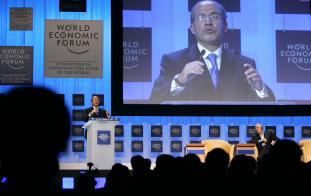 |
 |
 |
 Business News | January 2007 Business News | January 2007  
Calderon Faults Move to Socialism
 Juan Pablo Spinetto & Patrick Harrington - Bloomberg News Juan Pablo Spinetto & Patrick Harrington - Bloomberg News


| | Mexican President Felipe Calderon speaks to the World Economic Forum in Davos, Switzerland, last week. (Virginia Mayo/Associated Press) |
Mexican President Felipe Calderon used the global audience provided by the World Economic Forum in Davos, Switzerland, to warn that Latin America is splitting into two economic camps, one embracing a failed past of state control, the other seeking growth with foreign investment.

Calderon, 44, used some of the sharpest language of his 60-day presidency to deride a push, led by Venezuelan President Hugo Chavez, for increased state control of the region's economies.

In the past six months, Venezuela and Bolivia have moved to nationalize foreign assets, and Ecuador is threatening to default on its foreign debt. The countries are also weakening central bank autonomy.

'Move toward the past'

"Many countries in Latin America have chosen a move toward the past, and among their most harmful decisions are seeking nationalizations, expropriations, state control of the economy and authoritarianism," Calderon said in an interview in Davos. "Mexicans have decided to look to the future and to strengthen democracy, markets and investment."

Latin American nations must choose a path of democracy and free markets or risk falling behind competitors in the rest of the world, Calderon said.

Mexico, by asserting the rule of law and luring investment, will become one of the world's largest economies in coming decades, he said.

"Several countries in Latin America are acting against foreign investors, but we are thinking all the day, every day, how can we attract more investment to Mexico," Calderon said.

Calderon promised to quicken the growth of Mexico's $833 billion economy after an average expansion of about 2 percent during the first five years of former President Vicente Fox's term.

Tension with Chavez first surfaced during the presidential campaign last summer when Chavez openly supported Calderon's rival, Andres Manuel Lopez Obrador.

Calderon helped close a 10 percentage point gap in the polls with ads painting his opponent as a Chavez clone and won by less than 0.6 percentage point, the narrowest victory in the country's history.

'Hope of the future'

"Here comes the president of Mexico saying that Mexico is the hope of the future. I have doubts that being subordinate to the empire and world capitalism is the way for Mexico," Chavez said during a seven-hour televised speech Sunday. "He goes to Davos and says investors are coming to the Mexican economy. I hope so. I hope Mexico advances. But it's sad that a head of state to promote his country has to criticize other countries."

Mexico must also look to other nations for ways to boost investment and improve technology at its state-owned oil industry, Calderon said.

During the Davos meeting, he reached an agreement with Brazilian President Luiz Inacio Lula da Silva for increased cooperation between their countries' oil companies. Lula, who urged protection for democracy this month at a meeting of South American leaders, accepted an invitation to visit Mexico before August.

"We showed our interest in increasing our presence in Mexico," Jose Sergio Gabrielli, chief executive officer of Brazil's state-controlled oil company, Petroleo Brasileiro, said in an interview. "We said that we are interested in joint ventures with Pemex as well as offshore activities."

Pemex, Mexico's state-owned oil monopoly and the world's third-biggest oil producer, is seeking technology to tap deep-water reserves. Petroleo Brasileiro, or Petrobras, is a pioneer of deep-water drilling. Under Mexico's constitution, only Pemex, which in December posted a 12 percent plunge in annual output from a year ago, can extract crude and natural gas and refine oil.

"Mexico has important reserves that it has not been able to take advantage of because of a lack of adequate technology and because of a lack of investment," Calderon said. "We want to make Mexico one of the most important destinations for investment in the world."

Leading Latin America

Mexico led all Latin American countries in 2005 in attracting foreign direct investment, according to the United Nations' Economic Commission for Latin America, which is based in Santiago.

Mexico's foreign investment in 2005 was $17.8 billion, up from a 1996-2000 annual average of $12.6 billion.

Argentina fell to $4.7 billion in 2005 from an average of $11.6 billion.

Bolivia had a disinvestment in 2005 of $280 million.

In Venezuela, foreign investors sold $778 million more in Venezuelan assets than they bought in the first nine months of 2006, according to the central bank; a decade ago, in the same period, they added a net of $5.9 billion. | 
 | |
 |



